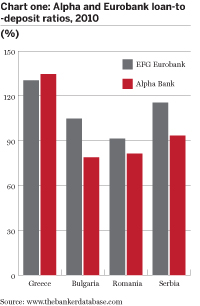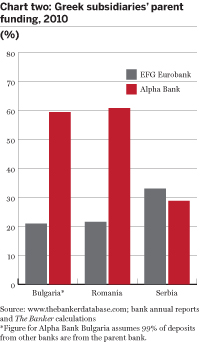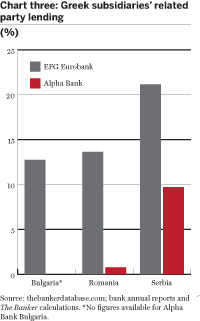Alpha Bank has warned that its potential merger partner Eurobank is more exposed to a Greek sovereign haircut, but the picture among both banks' foreign subsidiaries is a little different.
At the end of January 2012, Greece’s Alpha Bank warned that it was not willing to put a final date on the closing of its planned merger with peer EFG Eurobank, because of the ratcheting up of the proposed haircut on Greek sovereign debt. Alpha’s announcement warned that the impact of the private sector involvement (PSI) deal to write off part of the Greek government’s debt “is expected to affect the parties in a disproportionate manner”, implying that Eurobank’s exposure to sovereign risk is significantly higher than Alpha’s own.
There is no question that Alpha’s Greek operations appear safer. The bank remained narrowly in profit in the first half of 2011, despite taking the 21% haircut on Greek sovereign debt that was then proposed under PSI. By comparison, Eurobank lost €588m in the same period owing to its PSI write-downs. Alpha is more highly capitalised as well, with a BIS Tier 1 ratio of 11.9% at end-2010, and a straight capital-to-assets ratio (CAR) of 8.74%. By contrast, Eurobank’s BIS ratio was 10.6%, and its CAR much lower at 5.83%. Both banks face funding pressures, with loan-to-deposit (LTD) ratios of more than 130% in Greece at the start of 2011 (see chart one, excludes deposits from central bank), and further deposit outflows during the year.
But the picture in the three central and eastern European (CEE) markets where both banks operate – Bulgaria, Romania and Serbia – is less clear-cut. Both banks maintain high capital ratios in their subsidiaries, partly owing to local regulations that require a minimum 12% Tier 1 ratio.
The exception is Alpha Bank in Bulgaria, which is run as a branch without capital. Despite this, it is a large operation, with a 3% market share and assets about one-third the size of Eurobank’s subsidiary in the same country. Across all three countries, Eurobank’s operations are better capitalised, with BIS ratios exceeding 16% in Romania at end-2010, and 15% in Serbia – which apparently rose to more than 20% by the end of 2011.
Eurobank better funded
In terms of funding, at first sight it appears that Alpha is in a better position – all three of its subsidiaries had LTD ratios below 100%. By contrast, Eurobank’s LTD ratio in Bulgaria was in excess of 100%, and more than 115% in Serbia.
On closer examination, however, these LTD ratios do not tell the whole story. We use the figure for gross total deposits in our calculation, but this sometimes includes deposits by the parent bank in its local subsidiary, disguising reliance on parent funding. Adjusted for this factor, it is clear that Eurobank is considerably less reliant on parent funding in Romania and Bulgaria (see chart two).
Exact figures for parent funding in Alpha Bank Bulgaria are not available, but we have assumed that the proportion of parent deposits in the item 'deposits from other banks' is the same as for the Romanian operations – 99% of the total interbank deposits. This means well over half the funding for Alpha’s Romanian and Bulgarian operations comes from head office.
There is one final factor to consider – the extent to which liquidity obtained in CEE markets is used to fund the cash-strapped parent banks or other operations such as group real estate portfolios. Again, figures for Alpha Bank Bulgaria are not available, but in any case a clear pattern emerges. Lending by Eurobank’s CEE subsidiaries to their parent and other related parties constitutes a much higher proportion of total assets (see chart three).
This means overall that Eurobank’s CEE subsidiaries are better able to fund themselves locally in the teeth of their parent’s financing squeeze. But those same local depositors are also more exposed to potential losses if the parent’s solvency is threatened. On balance, a merger of CEE operations would still suit both Alpha and Eurobank.





